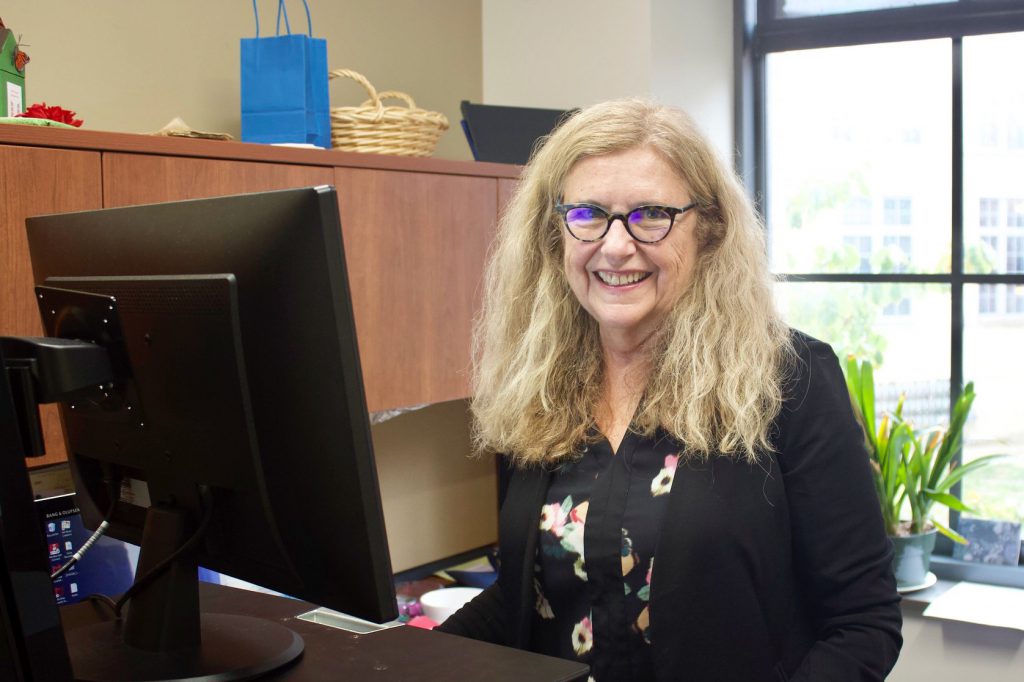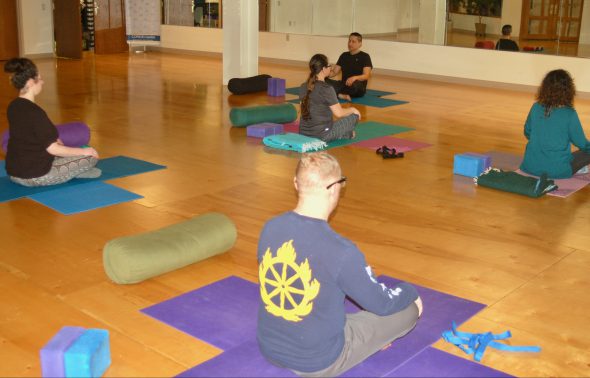Here’s Data You Can Use
Unique Milwaukee non-profit helps others gather and use data to improve their services.

Katie Pritchard, executive director of Data You Can Use, works with community groups on data projects that seek to foster awareness and create change. Photo by Caroline White/NNS.
Numbers can tell only part of a story.
They mean nothing without context.
And that’s where Data You Can Use steps in. The nonprofit works to provide useful local data so organizations can create change on a community level.
“In some of these neighborhoods, people have a fear of research because they’ve always been the subject, but they never see the results. That can be very damaging,” said Katie Pritchard, executive director and president of Data You Can Use. “If you’re only telling one part of the story, it doesn’t help anyone.”
Pritchard and Carrie Koss Vallejo, a data and research consultant, combined their comprehensive nonprofit experience to start Data You Can Use in 2016 at the UWM Zilber School of Public Health, 1240 N. 10th St. Together, with their small staff and an extensive professional network, they help their clients find, collect, analyze and understand data to better serve the community.
Lending a helping hand
Data You Can Use has worked with the Dominican Center and Amani United, among others, on a safety initiative for the Amani neighborhood on the North Side. First, it gathered the data already out there: population, education, crime, etc. Then it collected data that only Amani residents themselves could share.
Here’s where the second part of Data You Can Use’s slogan comes in — “from people you can trust.”
Rather than walk into a neighborhood staffers aren’t familiar with to survey strangers, Data You Can Use worked with community volunteers and trained them to conduct the surveys.

CORE El Centro, a nonprofit natural healing center in Walker’s Point, worked with Data You Can Use to measure its impact on clients. Photo by Edgar Mendez/NNS.
The survey showed the majority of residents was concerned about reckless driving. Amani neighborhood volunteers then took that information and started a movement to encourage safe driving by posting road signs and hanging up informational flyers.
Data You Can Use also helps those searching for data through its Data Dream competition. Local organizations are invited to apply for a $5,000 grant by pitching a problem that data could help them solve. Then the top three applicants present their project during the annual Data Day. This year, both the Brady Campaign Milwaukee staff and Walnut Way Conservation Corp. were named winners. The date of Data Day 2020 has yet to be announced.
In 2018, CORE El Centro, a nonprofit natural healing center, was one of the Data Dream winners. Barb Wesson, the outcomes manager, is familiar with the quantitative data CORE El Centro has on its clients. But when the staff started to wonder why their movement studio wasn’t getting as much use for other services, the numbers alone did not tell them why.
“We wanted to find a better way to measure the impact of what we do,” Wesson said. “One of the things Data You Can Use does really well that I don’t do at all is qualitative data analysis, and that’s what we needed.”
In addition to working with specific clients, Data You Can Use also gathers data for neighborhood portraits for residents to learn more about their communities and the city’s “indicators.”
The indicators Data You Can Use focuses on are population, equity and access, market value and health. They are meant to help community members and policymakers explore the growth and changes in the city.
Pritchard stressed the importance of allowing community organizations to contribute and give context to the data that’s out there.
Groups “help us do our job better,” Pritchard said. “The community can do better by working together.”
This story was originally published by Milwaukee Neighborhood News Service, where you can find other stories reporting on fifteen city neighborhoods in Milwaukee.






















Great work as always Katie!!!